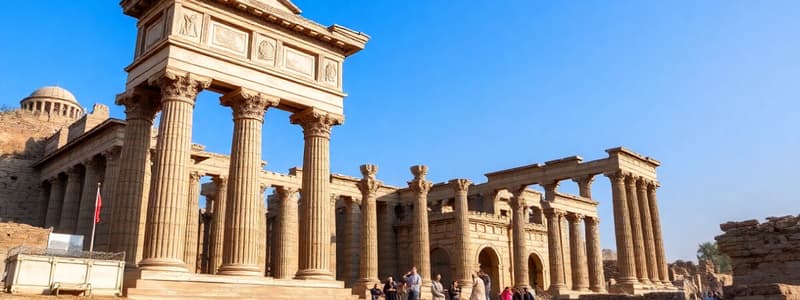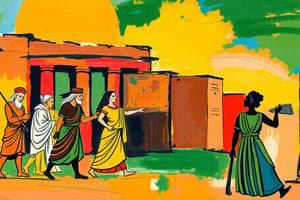Podcast
Questions and Answers
Who was the last active ruler of the Ptolemaic Kingdom of Egypt?
Who was the last active ruler of the Ptolemaic Kingdom of Egypt?
- Winston Churchill
- Cleopatra (correct)
- Mahatma Gandhi
- Julius Caesar
What document formalized the American colonies' freedom from British rule?
What document formalized the American colonies' freedom from British rule?
- Magna Carta
- Emancipation Proclamation
- United Nations Charter
- Declaration of Independence (correct)
Which of the following is considered a primary source?
Which of the following is considered a primary source?
- A scholarly article
- An official document (correct)
- A biography of Winston Churchill
- A history textbook
Which theme in history deals with the examination of governance and political structures?
Which theme in history deals with the examination of governance and political structures?
Who was a leader of the Indian independence movement against British rule?
Who was a leader of the Indian independence movement against British rule?
What was a significant consequence of the fall of the Roman Empire during the Middle Ages?
What was a significant consequence of the fall of the Roman Empire during the Middle Ages?
Which development is associated with the Ancient Civilizations era?
Which development is associated with the Ancient Civilizations era?
What was a major influence of the Renaissance period?
What was a major influence of the Renaissance period?
Which innovative technology is associated with the Industrial Revolution?
Which innovative technology is associated with the Industrial Revolution?
Who was a key figure associated with the Reformation?
Who was a key figure associated with the Reformation?
What concept refers to the sharing and blending of cultures throughout history?
What concept refers to the sharing and blending of cultures throughout history?
What was a major impact of the Age of Exploration on indigenous populations?
What was a major impact of the Age of Exploration on indigenous populations?
What is historiography concerned with?
What is historiography concerned with?
Flashcards are hidden until you start studying
Study Notes
Key Eras in History
-
Prehistoric Era
- Development of early human societies.
- Use of tools and discovery of fire.
- Development of language and art.
-
Ancient Civilizations
- Rise of Mesopotamia, Egypt, Indus Valley, and China.
- Invention of writing (cuneiform, hieroglyphs).
- Development of trade, agriculture, and centralized governments.
-
Classical Antiquity
- Greek and Roman civilizations.
- Philosophical advancements (Socrates, Plato, Aristotle).
- Spread of democracy and republic forms of governance.
-
Middle Ages
- Fall of the Roman Empire leading to feudalism.
- Rise of the Catholic Church and Islamic Caliphates.
- Cultural achievements (Gothic architecture, universities).
-
Renaissance
- Revival of art and learning based on classical sources.
- Key figures: Leonardo da Vinci, Michelangelo, and Galileo.
- Humanism and advancements in science and exploration.
-
Age of Exploration
- European exploration of Africa, Asia, and the Americas.
- Columbian Exchange: transfer of goods, ideas, and populations.
- Impact on indigenous populations and ecology.
-
Reformation and Enlightenment
- Religious reforms led by figures like Martin Luther.
- Enlightenment thinkers (Locke, Rousseau, Voltaire) promote reason over tradition.
- Emergence of modern democratic ideals.
-
Industrial Revolution
- Transition from agrarian economies to industrialized societies.
- Innovations in technology (steam engine, textile machinery).
- Urbanization and changes in labor dynamics.
-
20th Century Wars
- World War I and II: causes, major events, and repercussions.
- Cold War era and the division of the world into blocs (NATO vs. Warsaw Pact).
- Decolonization movements in Asia, Africa, and Latin America.
-
Contemporary History
- Globalization and the rise of the internet.
- Major events: 9/11 attacks, financial crises, climate change debates.
- Current geopolitical issues and shifts in power dynamics.
Key Historical Concepts
- Historiography: Study of how history is written and interpreted.
- Causation: Understanding the causes and effects of historical events.
- Continuity and Change: Examining what has remained the same and what has changed over time.
- Periodization: Dividing history into distinct periods for analysis.
- Cultural Exchange: The sharing and blending of cultures and ideas throughout history.
Important Historical Figures
- Cleopatra: Last active ruler of the Ptolemaic Kingdom of Egypt.
- Julius Caesar: Roman general and statesman whose actions led to the rise of the empire.
- Mahatma Gandhi: Leader of the Indian independence movement against British rule.
- Winston Churchill: British Prime Minister during World War II, known for his leadership.
Significant Documents
- Magna Carta (1215): Early charter limiting royal power and establishing rights.
- Declaration of Independence (1776): Formal assertion of the American colonies' freedom from British rule.
- United Nations Charter (1945): Foundational treaty for international cooperation post-WWII.
Methodologies in History
- Primary Sources: Firsthand accounts (letters, diaries, official documents).
- Secondary Sources: Analyses based on primary data (history books, articles).
- Oral History: Interviews and testimonies that capture personal experiences.
Themes in History
- Power and Authority: Examination of governance and political structures.
- Identity and Culture: Exploration of social norms, values, and shared heritage.
- Conflict and Cooperation: Analysis of wars, treaties, and alliances throughout history.
Key Eras in History
- Prehistoric Era marked the emergence of early human societies characterized by tool use, fire discovery, and the development of language and art.
- Ancient Civilizations saw the rise of Mesopotamia, Egypt, Indus Valley, and China, alongside the invention of writing systems like cuneiform and hieroglyphs, and advancements in trade, agriculture, and governance.
- Classical Antiquity is defined by Greek and Roman civilizations with significant contributions in philosophy from thinkers like Socrates, Plato, and Aristotle, and the introduction of democratic and republican governance structures.
- Middle Ages followed the fall of the Roman Empire and the establishment of feudalism, with the Catholic Church and Islamic Caliphates gaining influence, leading to cultural achievements including Gothic architecture and the founding of universities.
- Renaissance represented a resurgence of art and learning, inspired by classical sources, highlighted by key figures like Leonardo da Vinci, Michelangelo, and Galileo, with a strong emphasis on humanism and scientific advancements.
- Age of Exploration was characterized by European expeditions to Africa, Asia, and the Americas, resulting in the Columbian Exchange, which altered ecosystems and impacted indigenous populations.
- Reformation and Enlightenment were defined by significant religious reforms spearheaded by figures such as Martin Luther and the promotion of rational thought by Enlightenment thinkers like Locke, Rousseau, and Voltaire, laying the groundwork for modern democratic principles.
- Industrial Revolution shifted economies from agrarian to industrial, introducing technological innovations such as the steam engine, resulting in urbanization and transformation of labor dynamics.
- 20th Century Wars include major conflicts like World War I and II, which had profound causes and effects; the Cold War divided the world into opposing blocs, while decolonization movements reshaped Asia, Africa, and Latin America.
- Contemporary History is marked by globalization and the internet, significant events like the 9/11 attacks and financial crises, and ongoing discussions surrounding climate change and shifting geopolitical power dynamics.
Key Historical Concepts
- Historiography involves analyzing how historical narratives are constructed and understood.
- Causation focuses on identifying the underlying causes and effects of historical phenomena.
- Continuity and Change examines persistent patterns and shifts over time in societies and cultures.
- Periodization is the process of categorizing history into distinct segments for better analysis.
- Cultural Exchange describes the interchange and integration of ideas and practices across different societies throughout time.
Important Historical Figures
- Cleopatra served as the last active ruler of the Ptolemaic Kingdom of Egypt, symbolizing female power in ancient history.
- Julius Caesar was a pivotal Roman general and statesman whose rule contributed to the transition from Roman Republic to Empire.
- Mahatma Gandhi led India's nonviolent independence movement against British colonial rule, advocating for civil rights.
- Winston Churchill, as British Prime Minister during World War II, is noted for his leadership and resilience.
Significant Documents
- Magna Carta (1215) established the principle of limited royal authority and the rights of the governed.
- Declaration of Independence (1776) was a declaration of autonomy by the American colonies from British control.
- United Nations Charter (1945) laid the foundation for international cooperation and peacekeeping after World War II.
Methodologies in History
- Primary Sources include original materials such as letters, diaries, and official documents providing direct insights into historical events.
- Secondary Sources are derived analyses that interpret and contextualize primary data through books and scholarly articles.
- Oral History gathers personal narratives and testimonies illustrating individual experiences within historical contexts.
Themes in History
- Power and Authority explore governance structures and the dynamics of political control.
- Identity and Culture focus on societal values, norms, and collective heritage that shape communities.
- Conflict and Cooperation analyze the multifaceted nature of wars, treaties, and alliances throughout history.
Studying That Suits You
Use AI to generate personalized quizzes and flashcards to suit your learning preferences.




